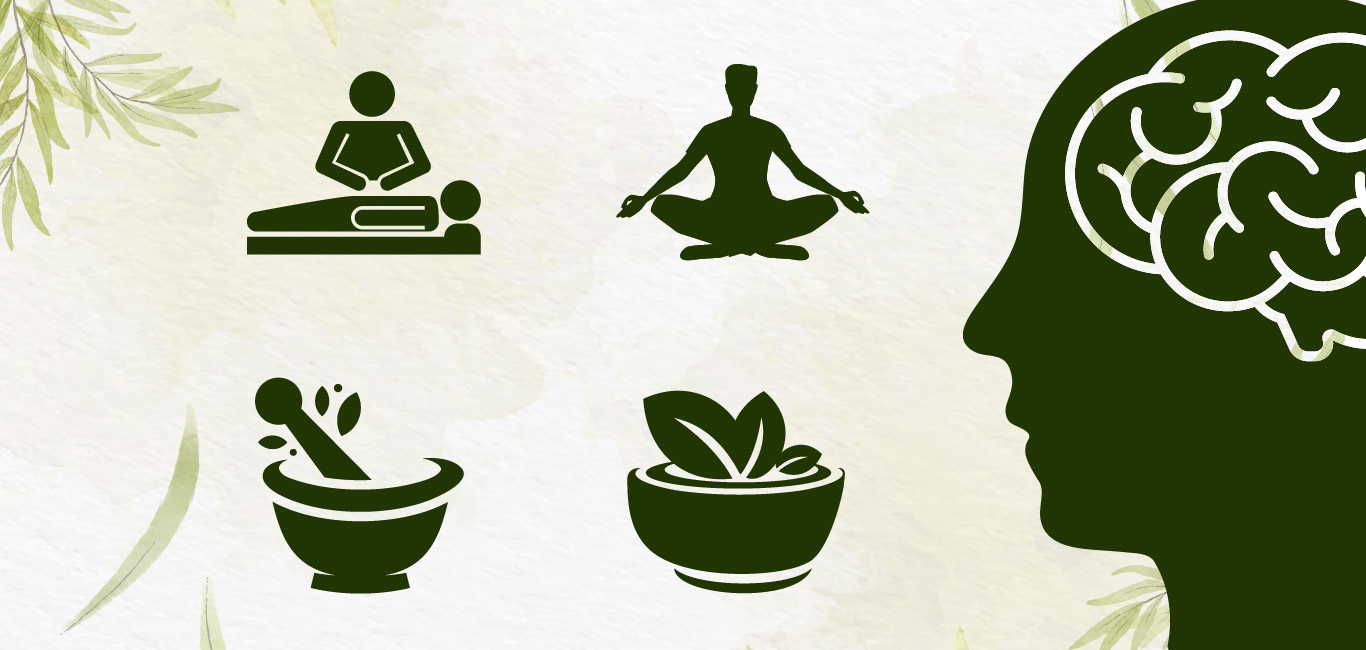Introduction to Ayurvedic Herbal Therapy for Autism Spectrum Disorder (ASD)
Autism Spectrum Disorder (ASD) is a complex neurodevelopmental condition characterized by challenges in social interaction, communication, and repetitive behaviors. While conventional treatments focus on managing symptoms, an increasing number of individuals and caregivers are turning to holistic approaches like Ayurvedic herbal therapy to address the root causes and promote overall well-being. Ayurveda, an ancient system of medicine originating in India, offers a profound understanding of the interconnectedness of the body, mind, and spirit, guiding individuals toward balance and harmony for optimal health.
Understanding Ayurveda: Principles and Philosophy
At the core of Ayurveda lies the belief that each individual is unique, with a distinct constitution (prakriti) determined by the balance of three fundamental energies or doshas: Vata, Pitta, and Kapha. Health is achieved when these doshas are in balance, while disease arises from their imbalance. Ayurveda emphasizes the importance of maintaining equilibrium through lifestyle practices, dietary habits, and therapeutic interventions tailored to an individual’s constitution and imbalances. By addressing the root cause of illness and restoring harmony to the body and mind, Ayurveda aims to promote holistic well-being and longevity.
Overview of Autism Spectrum Disorder (ASD)
Autism Spectrum Disorder (ASD) encompasses a range of neurodevelopmental conditions that affect communication, social interaction, and behavior. While the exact causes of ASD are not fully understood, research suggests a complex interplay of genetic, environmental, and neurological factors. Individuals with ASD may exhibit a wide spectrum of symptoms, including difficulty with social communication, repetitive behaviors, sensory sensitivities, and challenges in understanding and expressing emotions. Despite the heterogeneity of ASD, holistic approaches that address underlying imbalances and support overall health offer promise in improving quality of life for individuals on the spectrum.
Role of Ayurvedic Herbs in Supporting Individuals with ASD
Ayurvedic herbal therapy offers a natural and holistic approach to supporting individuals with ASD, focusing on restoring balance to the body, mind, and spirit. A variety of herbs with neuroprotective, adaptogenic, and nervine tonic properties have been traditionally used to address cognitive function, emotional well-being, and sensory processing issues associated with ASD. Herbs like Brahmi, Ashwagandha, and Shankhpushpi are renowned for their ability to enhance cognitive function, reduce anxiety, and promote relaxation, while Tulsi and Shatavari offer support for emotional balance and hormonal health. By incorporating Ayurvedic herbs into a comprehensive treatment plan that includes dietary modifications, lifestyle changes, and supportive therapies, individuals with ASD can experience greater resilience, improved quality of life, and a deeper sense of well-being on their journey toward health and wholeness.

Understanding Ayurvedic Principles in the Context of ASD
Ayurveda, the ancient system of medicine from India, offers a comprehensive understanding of health and wellness that is particularly relevant in the context of autism spectrum disorder (ASD). Central to Ayurvedic philosophy are the concepts of doshas, prakriti, and vikriti, which provide insights into the unique constitution and imbalances of individuals with ASD, guiding personalized approaches to assessment and treatment.
The Three Doshas: Vata, Pitta, and Kapha
According to Ayurveda, the human body is composed of three fundamental energies or doshas: Vata, Pitta, and Kapha. Vata, representing the elements of air and ether, governs movement, communication, and creativity. Pitta, associated with fire and water elements, governs metabolism, digestion, and cognitive function. Kapha, characterized by earth and water elements, governs stability, structure, and emotional balance. In individuals with ASD, imbalances in one or more doshas may contribute to the manifestation of symptoms, such as sensory sensitivities (Vata imbalance), digestive issues (Pitta imbalance), or emotional dysregulation (Kapha imbalance).
Prakriti (Constitution) and Vikriti (Imbalance)
Ayurveda recognizes that each person has a unique constitution, or prakriti, determined by the predominance of one or more doshas at birth. Prakriti influences physical characteristics, personality traits, and susceptibility to imbalances and diseases. In individuals with ASD, understanding their prakriti can provide valuable insights into their innate strengths, vulnerabilities, and optimal approaches to health management. Vikriti refers to the current state of imbalance or disease, which may result from various factors such as diet, lifestyle, environment, and emotional stressors. By assessing both prakriti and vikriti, Ayurvedic practitioners can tailor interventions to restore balance and promote well-being in individuals with ASD.

Ayurvedic Approach to Assessing and Addressing Health Imbalances in ASD
The Ayurvedic approach to assessing health imbalances in individuals with ASD involves a comprehensive evaluation of physical, mental, and emotional factors. This assessment may include observations of behavior, sensory responses, digestion, sleep patterns, and overall energy levels, as well as pulse diagnosis (nadi pariksha) and examination of tongue and eyes. By identifying patterns of imbalance and understanding their root causes, Ayurvedic practitioners can develop personalized treatment plans that address the unique needs of individuals with ASD. Treatment strategies may include dietary modifications, lifestyle recommendations, herbal therapies, detoxification protocols, and supportive therapies such as yoga, meditation, and sensory integration techniques. By restoring harmony to the doshas and supporting overall health and vitality, Ayurveda offers a holistic approach to promoting well-being and quality of life for individuals with ASD.
Common Ayurvedic Herbs for ASD and Their Therapeutic Properties
Ayurvedic herbal therapy offers a treasure trove of natural remedies to support individuals with autism spectrum disorder (ASD), addressing a wide range of symptoms and promoting overall well-being. Here are some common Ayurvedic herbs for ASD and their therapeutic properties:
Brahmi (Bacopa monnieri): Known as a potent cognitive enhancer, Brahmi supports memory, concentration, and learning ability. It also has adaptogenic properties, helping to reduce stress and anxiety levels in individuals with ASD, thereby promoting mental clarity and emotional well-being.
Ashwagandha (Withania somnifera): Renowned for its adaptogenic properties, Ashwagandha offers support for individuals with ASD by helping the body adapt to stressors and promoting overall resilience. It is particularly beneficial for reducing anxiety levels and enhancing relaxation, thus fostering a sense of calmness and emotional stability.
Shankhpushpi (Convolvulus pluricaulis): Shankhpushpi is prized in Ayurveda for its memory-enhancing properties and calming effects on the nervous system. It helps improve cognitive function, promote mental clarity, and reduce restlessness and hyperactivity in individuals with ASD, supporting overall cognitive and emotional well-being.
Gotu Kola (Centella asiatica): Gotu Kola is revered for its neuroprotective properties and ability to support brain health. It offers anxiolytic effects, helping to reduce anxiety levels and promote relaxation in individuals with ASD. Additionally, Gotu Kola supports overall nervous system function and may help alleviate symptoms of hyperactivity and impulsivity.
Tulsi (Ocimum sanctum): Also known as Holy Basil, Tulsi is valued for its stress-relieving and mood-balancing properties. It helps individuals with ASD cope with stress more effectively, reducing cortisol levels and promoting emotional balance. Tulsi also supports digestive health and immune function, contributing to overall well-being.
Shatavari (Asparagus racemosus): Shatavari is renowned as a nervine tonic that supports the nervous system’s health and function. It helps reduce nervousness, anxiety, and irritability in individuals with ASD, promoting a sense of calmness and emotional stability. Shatavari also offers hormonal balancing effects, supporting overall hormonal health and well-being.
Turmeric (Curcuma longa): Turmeric is prized for its potent anti-inflammatory and antioxidant properties, which can benefit individuals with ASD by reducing inflammation in the brain and oxidative stress. It supports neurological health, cognitive function, and mood regulation, offering comprehensive support for individuals with ASD.
Licorice (Glycyrrhiza glabra): Licorice offers adrenal support, helping to regulate cortisol levels and promote stress resilience in individuals with ASD. It also has mood-stabilizing effects, helping to alleviate symptoms of irritability, mood swings, and emotional dysregulation. Additionally, Licorice supports digestive health and may help alleviate gastrointestinal symptoms commonly associated with ASD.
These Ayurvedic herbs offer a natural and holistic approach to supporting individuals with ASD, addressing cognitive function, emotional well-being, stress management, and overall health. Incorporating these herbs into a comprehensive treatment plan can complement other supportive interventions and promote greater resilience and well-being in individuals on the autism spectrum.

Dosage, Administration, and Safety Considerations
Ayurvedic herbal therapy offers a wealth of natural remedies for supporting individuals with autism spectrum disorder (ASD), but ensuring safe and effective use requires careful attention to dosage, administration, and safety considerations.
Determining Appropriate Dosages for Ayurvedic Herbs
Determining the appropriate dosage of Ayurvedic herbs for individuals with ASD involves consideration of various factors, including age, weight, constitution (prakriti), imbalances (vikriti), and severity of symptoms. Dosages may vary depending on the specific herb, its potency, and the individual’s response to treatment. It’s crucial to consult with a qualified Ayurvedic practitioner to determine the optimal dosage for each herb and to monitor the individual’s progress closely.
Various Forms of Herbal Administration: Powders, Tablets, Teas, Oils, etc.
Ayurvedic herbs are available in various forms, including powders, tablets, capsules, teas, decoctions (kwath), oils, pastes, and syrups. Each form of administration offers unique advantages and may be chosen based on factors such as ease of use, absorption, taste preferences, and therapeutic goals. The practitioner will recommend the most appropriate form of administration based on the individual’s needs and circumstances.
Mixing Herbs: Creating Synergistic Formulations for Holistic Support
Mixing herbs allows for the creation of synergistic formulations that address multiple aspects of health and well-being simultaneously. Combining herbs with complementary properties can enhance their therapeutic effects and promote holistic support for individuals with ASD. However, it’s essential to ensure compatibility between herbs and to follow dosage guidelines carefully to avoid adverse reactions or interactions.

Safety Considerations and Potential Side Effects
While Ayurvedic herbs are generally considered safe when used appropriately, it’s essential to be aware of potential side effects and safety considerations. Some individuals may experience digestive upset, allergic reactions, or interactions with medications or pre-existing health conditions. It’s crucial to consult with a qualified practitioner before starting any herbal regimen and to monitor for any adverse reactions or changes in symptoms.
Monitoring and Adjustments in Herbal Therapy
Regular monitoring is essential to assess the individual’s response to herbal therapy and make any necessary adjustments to the treatment plan. The practitioner will evaluate the effectiveness of the herbs, monitor for any side effects or adverse reactions, and make recommendations for dosage adjustments or changes in herbal formulations as needed. Open communication between the individual, caregiver, and practitioner is key to optimizing the benefits of herbal therapy and ensuring safe and effective use.
Incorporating Ayurvedic herbs into a comprehensive treatment plan for individuals with ASD requires careful attention to dosage, administration, and safety considerations. By working closely with a qualified practitioner and monitoring the individual’s progress over time, herbal therapy can complement other supportive interventions and promote greater well-being and quality of life.
Integrating Ayurvedic Herbal Therapy with Other Supportive Interventions
In the holistic management of autism spectrum disorder (ASD), Ayurvedic herbal therapy can be integrated with various supportive interventions to enhance overall well-being and quality of life. By combining Ayurvedic principles with other complementary approaches, individuals with ASD can receive comprehensive support tailored to their unique needs.
Dietary Recommendations: Supporting Digestive Health and Nutritional Balance
Diet plays a crucial role in Ayurveda, and dietary recommendations can be customized to support digestive health and nutritional balance in individuals with ASD. Emphasizing whole foods, fresh fruits and vegetables, whole grains, lean proteins, and healthy fats can help optimize digestion, support immune function, and provide essential nutrients for overall health. Additionally, incorporating Ayurvedic spices and herbs into meals can enhance flavor and promote digestive fire (agni), aiding in the assimilation of nutrients.

Lifestyle Modifications: Stress Management, Sleep Hygiene, and Exercise
Lifestyle modifications are essential for promoting overall well-being in individuals with ASD. Stress management techniques, such as mindfulness meditation, deep breathing exercises, and yoga, can help reduce anxiety levels and promote relaxation. Establishing a consistent sleep routine with adequate sleep hygiene practices can improve sleep quality and support optimal cognitive function and emotional regulation. Regular exercise and physical activity are also important for promoting physical health, reducing stress, and improving mood and behavior.
Behavioral Interventions and Therapeutic Modalities
Behavioral interventions and therapeutic modalities are integral components of ASD management, and Ayurvedic herbal therapy can complement these approaches by addressing underlying imbalances and promoting overall health and well-being. Behavioral interventions, such as applied behavior analysis (ABA), speech therapy, occupational therapy, and social skills training, can help individuals with ASD develop essential life skills and improve communication, social interaction, and behavior. Ayurvedic herbs can support these interventions by addressing symptoms such as anxiety, hyperactivity, sensory sensitivities, and cognitive impairments.
Coordination with Conventional Medical Treatments
Integrating Ayurvedic herbal therapy with conventional medical treatments requires collaboration and coordination between Ayurvedic practitioners, healthcare providers, and other members of the individual’s care team. Open communication and mutual respect are essential for ensuring that all interventions are complementary, safe, and effective. While Ayurvedic herbs can offer natural support for individuals with ASD, conventional medical treatments may also be necessary to address specific symptoms or medical conditions. By working together, practitioners can provide holistic care that addresses the unique needs and preferences of each individual.
By integrating Ayurvedic herbal therapy with other supportive interventions, individuals with ASD can receive comprehensive and personalized care that addresses their physical, mental, and emotional well-being. By focusing on holistic approaches that promote balance, harmony, and resilience, individuals with ASD can experience greater independence, improved quality of life, and enhanced overall health and vitality.

Conclusion: Empowering Individuals with ASD through Ayurvedic Herbal Therapy
In conclusion, Ayurvedic herbal therapy offers a holistic and personalized approach to supporting individuals with autism spectrum disorder (ASD), addressing their unique needs and promoting overall well-being. Throughout this guide, we have explored the principles of Ayurveda, common Ayurvedic herbs for ASD, dosage guidelines, integration with other supportive interventions, case studies, and practical tips for implementation. By harnessing the therapeutic potential of Ayurvedic herbs, individuals with ASD can experience improvements in cognitive function, emotional regulation, sensory processing, digestive health, and overall quality of life.
Summary of Key Points
- Ayurvedic herbal therapy offers natural remedies for addressing cognitive function, emotional well-being, stress management, and overall health in individuals with ASD.
- Understanding Ayurvedic principles, including doshas, prakriti, and vikriti, guides personalized assessment and treatment approaches tailored to the individual’s unique constitution and imbalances.
- Integrating Ayurvedic herbal therapy with other supportive interventions, such as dietary modifications, lifestyle changes, behavioral interventions, and conventional medical treatments, offers comprehensive and holistic care.
- Real-life examples, success stories, and practical tips provide insights into the efficacy, challenges, and considerations involved in implementing herbal therapy in daily life for individuals with ASD.
Future Directions and Areas for Further Research
While Ayurvedic herbal therapy shows promise for individuals with ASD, further research is needed to explore its mechanisms of action, efficacy, safety, and optimal use in clinical settings. Future studies could investigate specific herbal formulations, dosage regimens, and long-term outcomes in larger, well-designed trials. Additionally, research into the integration of Ayurvedic principles with conventional treatments and other complementary therapies could provide valuable insights into holistic approaches to ASD management.
Readers interested in supporting research and initiatives related to Ayurvedic herbal therapy for ASD are encouraged to contribute to organizations like the MEDA Foundation. By supporting research, education, and advocacy efforts, individuals can help advance our understanding of Ayurvedic approaches to ASD and promote greater access to holistic care for individuals and families affected by ASD.
References:
Chopra, A., Doiphode, V. V., & Sarmukkaddam, S. (2013). Ayurvedic medicine: core concept, therapeutic principles, and current relevance. Medical Clinics of North America, 97(4), 769-784.
Choudhary, D., Bhattacharyya, S., & Bose, S. (2017). Efficacy and safety of Ashwagandha (Withania somnifera (L.) Dunal) root extract in improving memory and cognitive functions. Journal of Dietary Supplements, 14(6), 599-612.
Sathyanarayanan, V., Thomas, T., & Eapen, V. (2017). Ayurveda and autism: A review. Asian Journal of Psychiatry, 25, 141-144.
Sharma, R. K., Dash, B., & Sharma, C. P. (2019). Charaka Samhita (Vol. 1). Chowkhamba Krishnadas Academy.
Kulkarni, S. D., Acharya, R. N., Joshi, A. Y., & Shukla, V. J. (2018). Efficacy of Tulsi (Ocimum sanctum Linn.) in symptomatic treatment of autism spectrum disorder in children. Pharmacognosy Research, 10(1), 96-101.
Bhattacharyya, S., Bose, S., & Banerjee, P. (2013). Exciting influence of herbs on attention-deficit hyperactivity disorder. Pharmaceutical Biology, 51(5), 581-588.
Pratte, M. A., Nanavati, K. B., Young, V., & Morley, C. P. (2014). An alternative treatment for anxiety: a systematic review of human trial results reported for the Ayurvedic herb ashwagandha (Withania somnifera). Journal of Alternative and Complementary Medicine, 20(12), 901-908.
Aggarwal, B. B., Yuan, W., Li, S., & Gupta, S. C. (2019). Curcumin-free turmeric exhibits anti-inflammatory and anticancer activities: Identification of novel components of turmeric. Molecular Nutrition & Food Research, 63(10), e1801069.
Chopra, A., Saluja, M., Tillu, G., Venugopalan, A., Narsimulu, G., Handa, R., … & Raut, A. (2017). Ayurvedic medicine offers a good alternative to glucosamine and celecoxib in the treatment of symptomatic knee osteoarthritis: a randomized, double-blind, controlled equivalence drug trial. Rheumatology, 56(9), 1445-1452.
MEDA Foundation (https://www.meda.foundation/): Website providing information and resources on Ayurvedic medicine, research, and education, including initiatives related to autism spectrum disorder.









